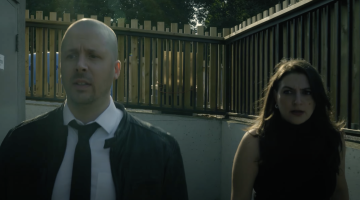NOTE: A version of this article was previously posted on the author’s Medium blog, and can be viewed here.
Cracked walls. Leaky ceilings. Rat and roach infestations. Mold. For the frustrated tenants of many high rise apartments in New York City, their frustration with these and many other unacceptable living conditions they’re forced to deal with every day is exacerbated by the high rent they’re forced to pay their landlords in exchange for staying in these complexes, and their anger towards these outrageously rich and impossible-to-reach owners who constantly fail to fix their problems.
One man deeply familiar with this painful situation is comedian/filmmaker/longtime New Yorker Jeff Seal, who in 2017 teamed up with sibling auteurs the Libbey Brothers to investigate how and why some of the greediest real estate developers in the Big Apple have made day-to-day life an aggravating struggle for the lower-middle class apartment residents they’re supposed to provide for.
The end product of the partnership between Seal and the Libbeys is the new three-part documentary series New York’s Worst Landlords, which premiered on YouTube on June 7th, and is streaming in its entirety on Seal’s YouTube channel (linked to below).
With Seal’s humorous yet passionate point-of-view motivating the show’s probe of its otherwise serious subject matter, Seal’s usage of guerrilla filmmaking techniques (like going undercover at a landlords’ convention in the third episode) and comedic asides (like his attempts to call landlords on the New York City Public Advocate’s “Worst Landlord Watchlist” by hosting a faux telethon in episode 1) helps audiences understand the sneaky and manipulative tactics of these profit-obsessed moguls.

Jeff Seal (right) talks to the receptionist of a large New York City landlord (left) as he attempts to honor his employer with the “Worst Landlord Award” in the humorous yet impactful new docuseries NEW YORK’S WORST LANDLORDS.
After failing to get them to talk on the phone, Seal memorably tries to reach these distant landlords up-close and personal in classic “ambush interview” fashion in the show’s first two episodes, which only gets his would-be subjects even more ticked off as the Libbeys’ cameras record it all.
Its funny stunts aside, New York’s Worst Landlords lands its greatest punch through Seal’s revealing conversations with then-New York City Public Advocate (now New York State Attorney General) Letitia James, and actual apartment tenants who show Seal and viewers the many problems that they’re stuck with due to their landlords’ unwillingness to respond to their complaints.
After forming a tenants’ association, they later band together to convince New York State legislators to force landlords to either improve the quality of their apartments or sell them to owners that will commit to making those improvements.
Several months before the show’s premiere, Seal chatted with Snobby Robot about his many challenges making New York’s Worst Landlords, the personal connection he shares with the tenants he met (including one woman whose story and activism made the greatest impact on him), and the continued importance of creating a safe place for rent-stabilized apartment residents to live amid the continuing presence of COVID-19 in America.
Chris Hadley: Since you live in New York City, in what ways (if any) have your experiences with bad landlords and the unacceptable living conditions of apartment complexes informed your work on this series?
Jeff Seal (host/narrator, New York’s Worst Landlords): I think pretty much anyone who’s lived in New York City, or any larger city for a good amount of time, has a bad landlord story, but there was actually a huge learning curve that we went through as we learned more about how landlords used loopholes in rent laws to force evictions and raise rents. So the process of making the documentary was more about learning from the tenants and tenant advocates we interviewed and less about our own experiences.
However, it was still very personal for me and it obviously didn’t lessen how pissed off I became when I witnessed what people in my documentary had to go through. I love New York City and it enrages me when I see everyone but the most wealthy get forced out of the city. I think everyone, myself included, is incredibly frustrated about how much money we give to our landlords every month even if they’re a good landlord.
CH: You’ve balanced the straightforward documentary approach of New York’s Worst Landlords with a healthy dose of humor. Describe how that helps viewers not only to understand the serious issues that this series examines, but to relate to the problems that the tenants you’ve talked to have dealt with – especially if they’ve never lived in poorly-maintained apartments or dealt with unresponsive landlords.
JS: Yes, that was one of the main challenges of this project — finding the right balance of humor and also treating our subjects with respect and dignity while exploring a very serious issue. It’s something we spent a lot of time discussing as we edited.
The comedy is hopefully always at the expense of the landlords or, in some cases, myself, but yeah, we wanted to make something funny and entertaining to draw in more viewers and then shed light on the housing crisis in New York City. I guess we want to make people laugh and then (for them to) get pissed off and then call their state (representatives) or start a tenants’ association in their building.

Tenants fed up with their unresponsive landlords and their equally untenable living conditions lobby New York State legislators for urgently needed reform in 2019, a story examined in-depth in the final episode of NEW YORK’S WORST LANDLORDS.
CH: Of all the people whose stories you’ve heard in the series, which one(s) stood out to you?
JS: In all honesty, I sat with all of these stories for so long while editing this project that I don’t know if a particular one stands out. They’re all so firmly lodged in my brain. I’ve stayed the most in contact with Gloria Nieves (a resident of one of the apartments) and she’s been giving me updates about the situation where she lives.
Through their tenant association’s work with the housing lawyer (Kevin Worthington at Communities Resist) they’ve forced the bank to take over the building because the owners, Silvershore, and the management company, J. Wasser, were still not taking proper care of the building. So I wish I could have included it in the video but I’m obviously super happy for her nonetheless.
CH: As seen in the first two episodes, your attempts to get in touch with these landlords are met with extreme resistance (so much so that they try to call the cops on you and your crew). Is this because they insist on shielding themselves from accountability? Is it because they feel they’re superior to their tenants, or is it because they have a lot of things they don’t want them to know about in terms of their business practices?
JS: Well, I couldn’t say for sure because they wouldn’t let me interview them. In general, one of the common themes we found is that many tenants simply don’t even know who their actual landlord is. So yes, this is one way they escape accountability. The case I kept making to the landlords (usually through their lawyer or public relations person) is, if you’re doing your job correctly as a landlord you should be unafraid to sit down with anyone and answer their questions about how they run their buildings.
In the first episode, we went to 199 Lee Ave. Shipping and Communications (a business in New York City) where over a thousand LLC’s (limited liability corporations) who own or manage apartment buildings receive their mail. The guy we talked to said people showed up on a weekly basis looking for their landlord. Tenants should be able to know who they’re giving their money to every month and who they should call when the repairs they need aren’t getting done.
The reason a company like Silvershore doesn’t want to sit down for an interview is because they own so many buildings. They bought and sold large swaths of properties for hundreds of millions of dollars. So they really have no clue what is actually happening in their buildings because they’re more like investors who use people’s homes as commodities then they are landlords who provide people with proper housing. They bought certain buildings with the explicit purpose of evicting people in rent stabilized units and then raising the rent. That’s literally their business plan.
I can’t remember where exactly but I read in the description for a building that was for sale that it had “unlocked profit potential” or something like that. What that means is, once you force people out you can raise the rent and make more money. So, again, they’re more like investors than landlords.
We didn’t profile any small landlords who own one or two buildings and actually know who their tenants are. Those landlords are actually hurting right now because of the pandemic and need help just as badly as the renters do.

In the show’s first episode, Seal tries to cold call the most notorious yet reclusive New York City landlords through a faux telethon.
CH: In the third episode, you actually go undercover at a landlords’ convention. What was that experience like, what were some of the most challenging parts of filming covertly at that convention, and why did you ultimately have to blur your own face on the footage we see in that third episode?
JS: I was amazed at what the vendors and landlords were saying and I was just praying we were getting good audio. What amazed me the most was the callousness they have towards tenants and particularly tenants in rent-stabilized units.
I literally said to them: “I own a bunch of buildings with rent stabilized units and I want to evict them so I can raise the rent,” and none of them batted an eyelid or said, “gee, that’s kinda f*cked up, don’t you think?” They all were like, “yeah, I’d love to do business with you!” or “good luck with that!”
By the end of the day I was so deep into my character and drunk on power and the free mimosas at the brunch buffet that I had to blur out my own face. (I didn’t actually blur out my own face or get drunk — that was just a joke I put in the “In The Next Episode” teaser section at the end of the first episode.)
CH: Now that the New York State legislature has passed much-needed rent reforms for these neglected apartment complexes, how (if at all) have those reforms helped to make the living conditions better for tenants of these complexes? What’s changed, and what has stayed the same as a result?
JS: There are other people who can answer this question much better than I can but without getting into all the specific loopholes that were removed in the rent laws that allowed landlords to deregulate apartments and raise the rent to market rate, the main thing is (is) that it permanently saved the roughly 1 million rent-regulated apartments left in New York City.
That means landlords no longer have the incentive to force out tenants in these units because they can’t raise the rent once the apartment becomes vacant like they used to be able to. So that’s huge but it’s also not nearly enough. I’ve read that landlords are purposefully keeping rent stabilized units vacant in the hopes that they’ll be able to undo the laws through lawsuits in the courts or with new legislation. I’ve also read that there are tons of market rate luxury apartments that landlords would rather keep empty than, God forbid, lower the rent.
CH: Since the coronavirus has struck New York City and the entire country, in what ways has that changed not only the quality of life inside these apartments but also the level of responsibility that these landlords have to their tenants? Has it gotten better or worse since then?
JS: Again, there are lots of people who can speak to this much better than I can but the main thing is that, luckily, Albany (New York’s capital city), in its last budget, was able to include emergency funding to help New York State renters pay back all of the roughly $1 billion that is owed in back-rent. If that didn’t happen there would have been evictions on a massive scale and a huge surge in homelessness. It would have been a disaster for all New Yorkers.
The tenant movement played a huge part in making sure this didn’t happen by putting pressure on (New York) State Representatives to find a way to protect renters who were behind on their rent. Obviously this is good for landlords too because they’ll get all that back-rent paid back. (Here’s a link for people who are behind on their rent due to COVID to apply for rent relief. The money will go directly to their landlord.)

Jeff Seal, host/narrator of the new comedy docuseries NEW YORK’S WORST LANDLORDS, now streaming in full on Seal’s YouTube channel.
CH: Overall, what was the production process like for New York’s Worst Landlords – and how, if at all, did the pandemic ultimately affect that process?
JS: We started filming around 3 years ago. We obviously haven’t been working on it non-stop since then but we spent a lot of time following up with different tenants and trying different tactics to try and talk to actual landlords.
We’ve spent a lot of time editing and then re-editing and then editing some more. It took us a long time to shape the story and get everything we wanted in the final cuts while also keeping the videos engaging.
We had wrapped most of the filming by the time the pandemic hit so that didn’t affect us too much but we did want to address it at the end of the third video because, again, we are on the verge of a major housing crisis if nothing is done to help everyone who is behind on rent.
CH: As both a filmmaker and a citizen, how has working on this project helped you to better understand and appreciate the struggles of these tenants and the ongoing problem of poor living conditions in New York City’s rent-stabilized apartments?
JS: Well, I’ve actually been super inspired by a lot of the people we profiled. They started tenant associations, went on rent strike and had their demands met by the management, and in Gloria’s case, they basically had their landlord fired. The overall tenant movement in New York is very powerful and effective — the laws they were able to get Albany (legislators in New York’s state capitol) to pass in 2019 were huge.
The effects of these laws will be felt for a long time, but of course this took decades of hard work and they’re also still fighting for a lot more because there still is a long way to go. So we’ve just really dipped our toes into this issue. We also didn’t even touch on NYCHA (the New York City Housing Authority) which has its own set of problems that really need fixing.

The sibling production team behind NEW YORK’S WORST LANDLORDS, the Libbey brothers: Chris (left), Nick (right).
CH: What do you hope people take away from watching New York’s Worst Landlords, and do you feel that it could inspire viewers who’ve dealt with the same problems faced by the tenants?
JS: I think one thing everyone should know is that tenants have more rights in New York City than in many other parts of the country.
People should realize that we pay our landlords lots of money each month so we can have a safe and comfortable place to live. So we shouldn’t be afraid to ask them for repairs or live in fear of eviction. That’s their one job — to provide us with a functioning home in exchange for lots of money.
In the bigger picture, we need to start viewing housing the same way we view healthcare — as a human right that everyone deserves, not a privilege for those who can afford it. We can’t continue to rely on private developers who set aside 10% or 20% in a new luxury building for “affordable” housing that isn’t actually affordable for most New Yorkers.
We used to receive tons of federal money for affordable housing — can you imagine what Manhattan would look like without public housing or rent-stabilized units? There would only be wealthy people living there. We need to fundamentally rethink how we approach housing in this country because we’ve seen what a profit-driven model that’s only beholden to the free market will do: make rents go higher and higher, no matter what the human cost.
NOTE: Seal says that all episodes of New York’s Worst Landlords will be closed-captioned.
Watch all three episodes of New York’s Worst Landlords on Seal’s YouTube channel:











No Comment